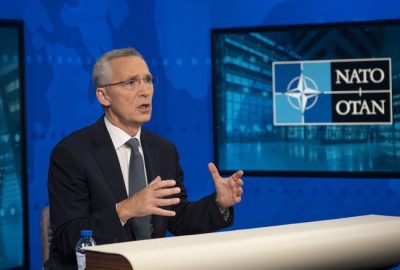NATO Secretary General Jens Stoltenberg was back home in Norway this week, but busy making the rounds of local news broadcasts, an appearance at a think tank meeting and even appearing on a local talk show. Russia’s war on Ukraine still takes up most of his waking hours, with no end in sight.

“We have no indications or signs that (Russian President Vladimir) Putin has changed his fundamental goal, that he wants control of Ukraine,” Stoltenberg said at a breakfast meeting of the conservative think tank Civita at the University of Oslo Thursday morning. His message was much the same when appearing on Norwegian Broadcasting’s nightly national newscast Dagsrevyen Thursday evening, at which he added that he sees no basis for any talks with Russia right now.
Able to speak in his native Norwegian again, Stoltenberg appeared comfortable even when talking about the brutality Putin is showing on a daily basis. He said he thinks Putin underestimated both the Ukrainians’ battle strength and motivation, along with western nations’ willingness to support Ukraine.
Despite all that, he said NATO nonetheless sees no signs that Putin will give up any time soon despite heavy losses. “He has adjusted his ambition level regarding how fast he can gain control,” Stoltenberg said, but still wants control.
Stoltenberg said he feels a “great responsibility” as NATO chief to bring an end to the war in Ukraine. Prospects for that are not good at present.
“In order to have that conversation (with Putin), I’d have to think there’s something we can achieve,” he told NRK. He noted that he and many others within NATO worked “intensely” to halt the war during the days before Putin invaded Ukraine last February, but said it became clear Putin had made up his mind to go on the attack.
Since then there’s been little contact between the two men who met several times when Stoltenberg was prime minister in Norway and Putin was still up-and-coming as Russia’s elected leader. The good relations Stoltenberg thinks they once had are over.
“As long as Puting continues his brutal warfare, and not least attacking gas, water and power plants that force the Ukrainians to freeze all winter, there’s no basis for any talks,” Stoltenberg said. That will only happen, he said, when the Russians respect Ukraine as an independent state.
He acknowledged that he has long days, is always on call and under heavy pressure, “but nothing in comparison to what the Ukrainians are enduring every single day. I feel great responsibility to bring an end to this war, to secure Ukraine as an independent nation in Europe, and the best way to do that is to support them.”
He recalled how he his foreign minister Jonas Gahr Støre met Putin first on an official basis in 2001, when Putin was prime minister. They met often during the 2000s, when hopes were high that Russia would secure good relations with many other countries. That hope disappeared in 2014 when Putin had become much more authoritarian and annexed Ukraine’s Crimean Peninsula. That was also just as Stoltenberg was preparing to take over as NATO chief.
“Since then relations have become steadily worse,” Stoltenberg told NRK. “We have tried, but the Russian have chosen confrontation. That’s why we are where we are now.”
He doesn’t think relations between Russia and Norway can ever become “normal” again. “Confidence has been destroyed and will remain so as long as Russia has ambitions of controlling neighbouring countries,” Stoltenberg said. “We also know that gas supplies from Russia won’t come back, and we can’t make ourselves dependent on Russian gas again. That’s a lasting change.”
The personable and popular Stoltenberg nonetheless thinks it’s important to celebrate the Christmas holidays, adding that he intends to spend them with his family in Norway.
“This year it’s even more important, and to think about peace and taking care of one another,” said Stoltenberg, who’s not giving up. “I have strong faith that democracy and freedom will win in the end.”
His visit to Oslo is also taking place during the Nobel Peace Prize Days, with the prize to be celebrated and presented to three representatives of human rights organizations in Ukraine, Russia and Belarus during the weekend.
NewsinEnglish.no/Nina Berglund

